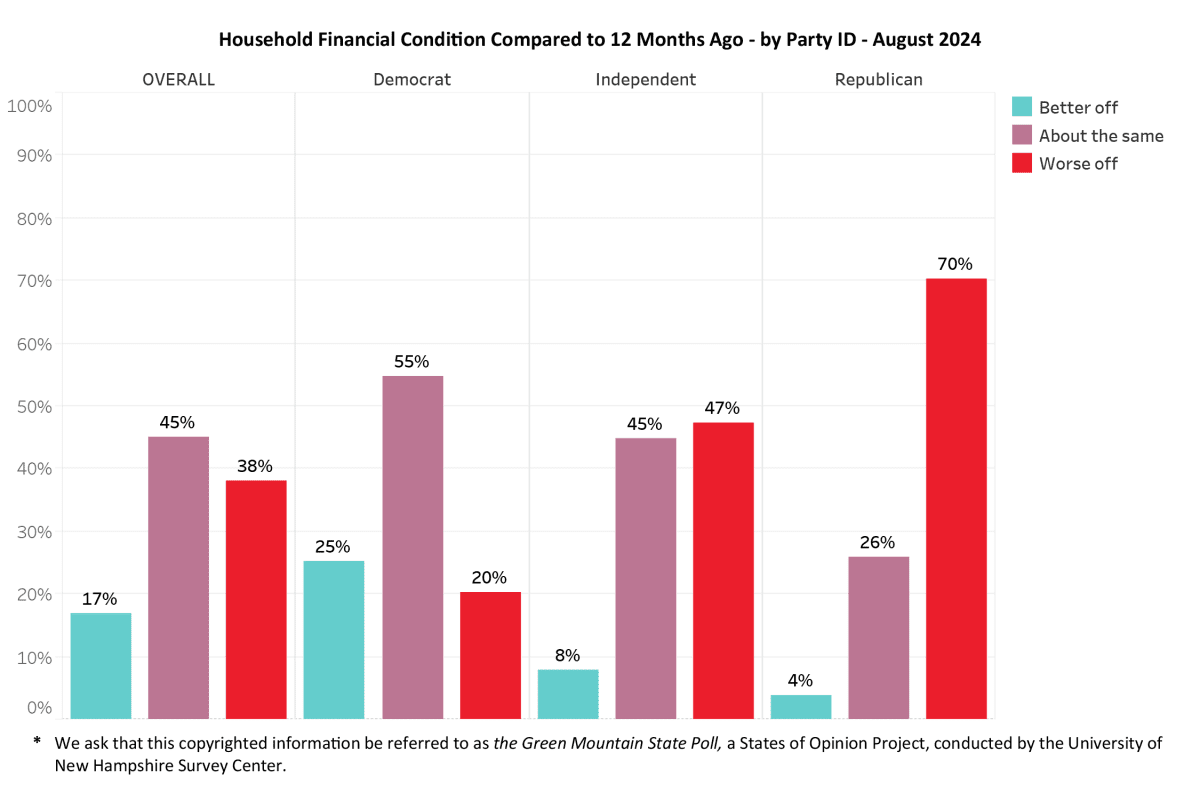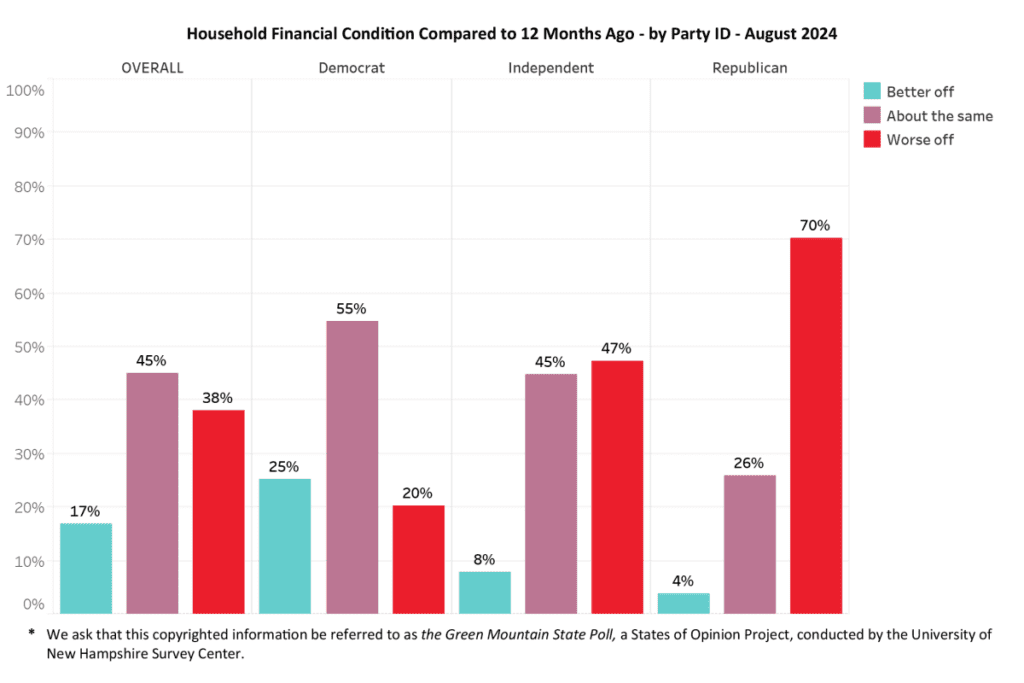
A newly released poll from the University of New Hampshire found that nearly 40% of Vermonters surveyed feel their personal financial conditions are worse off than they were one year ago, and 42% of Vermonters surveyed reported at least some difficulty paying for basic necessities in the past year.
Largely coloring respondents’ views of the economy was their political affiliation, the poll found. Out of 841 Vermonters surveyed between Aug. 15 and 19, only 20% of those who identified as Democrats said their personal finances are worse off than they were one year ago. In comparison, 47% of independents said they were worse off, as did 70% of Republicans.
The Green Mountain State Poll, conducted by the UNH Survey Center, had a margin of error of 3.1%.
And even though Vermont state economists have told political leaders several times that they do not see a recession on the state’s horizon, 47% of Vermonters who responded to the survey said they think it’s somewhat or very likely that the United States will enter a recession in the next year. That’s compared to 43% who feel an impending recession is somewhat or very unlikely.
Broken down by party, 91% of Republicans and 66% of independents surveyed said they felt a recession was imminent — or even active currently — compared to 30% of Democrats.
To Andrew Smith, the director of the University of New Hampshire’s Survey Center, the poll’s findings on the relationship between Vermonters’ political affiliations and views of the economy were unsurprising. He told VTDigger on Tuesday that the results follow a nationwide trend — dating back to the Bush administration, he hypothesized — of voters viewing the economy through their personal partisan lens.
Equating the phenomenon to a person’s allegiance to their preferred sports team, Smith said, “It’s partially rational, but it’s really not.”
“We literally are viewing the world through rose colored glasses — or, I guess, blue glasses,” Smith said. “We’re rooting for our team all of the time in politics, and we’re looking for a reason that we can blame the other people.”
Bert Johnson, a professor of political science at Middlebury College, also said he found the survey’s results unsurprising, pointing to “a big divergence between Democrats and Republicans on how they’ve viewed both their personal circumstances and the state of the economy, at large.”
Asked why, Johnson told VTDigger on Tuesday, “I think it’s part of what we’ve seen about how partisanship has evolved into a personal identity characteristic.”
“It used to be something like a commercial brand — you know, ‘I prefer this kind of toothpaste, and I don’t really care that much which kind of toothpaste I prefer,’” Johnson said. “Now, it’s much more like an identity characteristic, like one’s religion or race or gender identity. And so people feel it much more closely, and they feel aligned with it in a way that sets them up as against the other party.”
Smith said voters’ views of the economy are largely shaped by whether their preferred party is in charge — particularly in Washington.
“I’ve been seeing this with consumer confidence — that as soon as one party leaves office, the trend lines switch. They just flip,” Smith said. “So when George W. Bush was president, Republicans thought the economy was great. Democrats thought it sucked. When it went to Obama, Democrats thought the economy was great, Republicans (thought it) sucked.”
Poll shows ‘just how much people are struggling’
Economic factors do not affect people differently based on their political persuasion. But according to Smith, political persuasion “colors our perceptions of our own lives.”
He pointed to research he conducted leading up to the 2012 presidential election, in which he surveyed voters’ views of the economy with specific questions on their personal circumstances: “Did you lose your job? Did you lose your health insurance? … A whole host of specific things that you could measure.”
“You could look at people that were almost identical: high-income Republicans and Democrats that had the same bad things happen to them, or low-income, the same bad things that happened to them,” Smith said. “If you were a Republican, everything was terrible. It was worst it’s ever been. If you were if you were a Democrat — because Obama was the president at that time — everything was great.”
Now, in 2024, while inflation has slowed nationally, consumer prices for basic necessities remain high. Housing prices remain high, as do interest rates. Unemployment is low, though job growth appears to be slowing.
According to Vermont State University political science professor Rich Clark, to attribute people’s perceptions of the economy to any one factor “would be foolish.”
“There are those who are sitting in front of their TV, who catch the NASDAQ and the Dow Jones every day, and that’s affecting their views of it. There are those who are in the supermarket checkout line, and that’s what’s affecting it,” Clark said. “There’s so many factors in there, it’s so situational, that we’d have to say that it’s a host of different things.”
What he said is clear from the survey, though, is “just how much people are struggling” based on their incomes. Overall, 42% of Vermonters told pollsters that they are struggling to meet their basic needs somewhat or “a lot.” For those whose household income is less than $75,000, that percentage jumps to 60%.
Compare that to those who live in a household earning more than $150,000 annually: 14% of those respondents said they are at least somewhat struggling to afford basic necessities. The vast majority, 73%, said they do not “at all.”
“For all of the talk that inflation is coming down — and it is — prices are not coming down, and people are seeing that,” Clark said. “And poorer people, of course, are spending a larger portion of their income on groceries, and so they’re going to feel it even more.”
Looking ahead, 59% of Republicans and 39% of independents surveyed predicted that they would be worse off financially in one year, compared to only 10% of Democrats. The top three reasons why Vermonters predicted they’d be worse off in 12 months, according to the poll, were taxes (26%), cost of living (20%) and inflation (19%).
As for that topline concern — taxes — Clark said that response was “really interesting.”
“I’m imagining, because this is Vermont, that they’re saying the property taxes,” Clark said. “We’ve heard the governor talk about that issue quite a bit. Why are we rejecting school board budgets? Property taxes.”
It was the portion of the poll that Vermont Republican Party Chair Paul Dame latched onto in a statement Tuesday, calling taxes “the problem, not the solution.”
“What I also find revealing about this survey is the disparity between Democrat responses compared to Republicans and Independents,“ Dame wrote. “Independents seem to be much more aligned with Republicans in their concern, while Democrats don’t really see the same problems we see. Or they are not feeling it as severely as Republicans and Independents are.”
It’s a talking point that Republican Gov. Phil Scott has emphasized this election cycle, as he campaigns for his fifth two-year term in the Governor’s Office — and stumps for down-ballot candidates aiming to chip away at Democrats’ supermajority in the state House and Senate.
But to Jim Dandeneau, the executive director of the Vermont Democratic Party, those who cited taxes as their number one reason for future economic anxiety are just a subset of total poll respondents. More telling, he said, were the disparities in financial comfort between income brackets.
“Democrats have spent the last eight years trying to make Vermont work for everyone, and not just the privileged few,” he said. “This, I think, conveys some of the urgency around how we communicate that stuff.
Source link : http://www.bing.com/news/apiclick.aspx?ref=FexRss&aid=&tid=66ceabf9b2c74f2aa11b42a100e3e0b1&url=https%3A%2F%2Fvtdigger.org%2F2024%2F08%2F27%2Funh-poll-vermont-republicans-and-democrats-have-widely-different-takes-on-the-economy%2F&c=10196580461322778818&mkt=en-us
Author :
Publish date : 2024-08-27 15:10:00
Copyright for syndicated content belongs to the linked Source.
